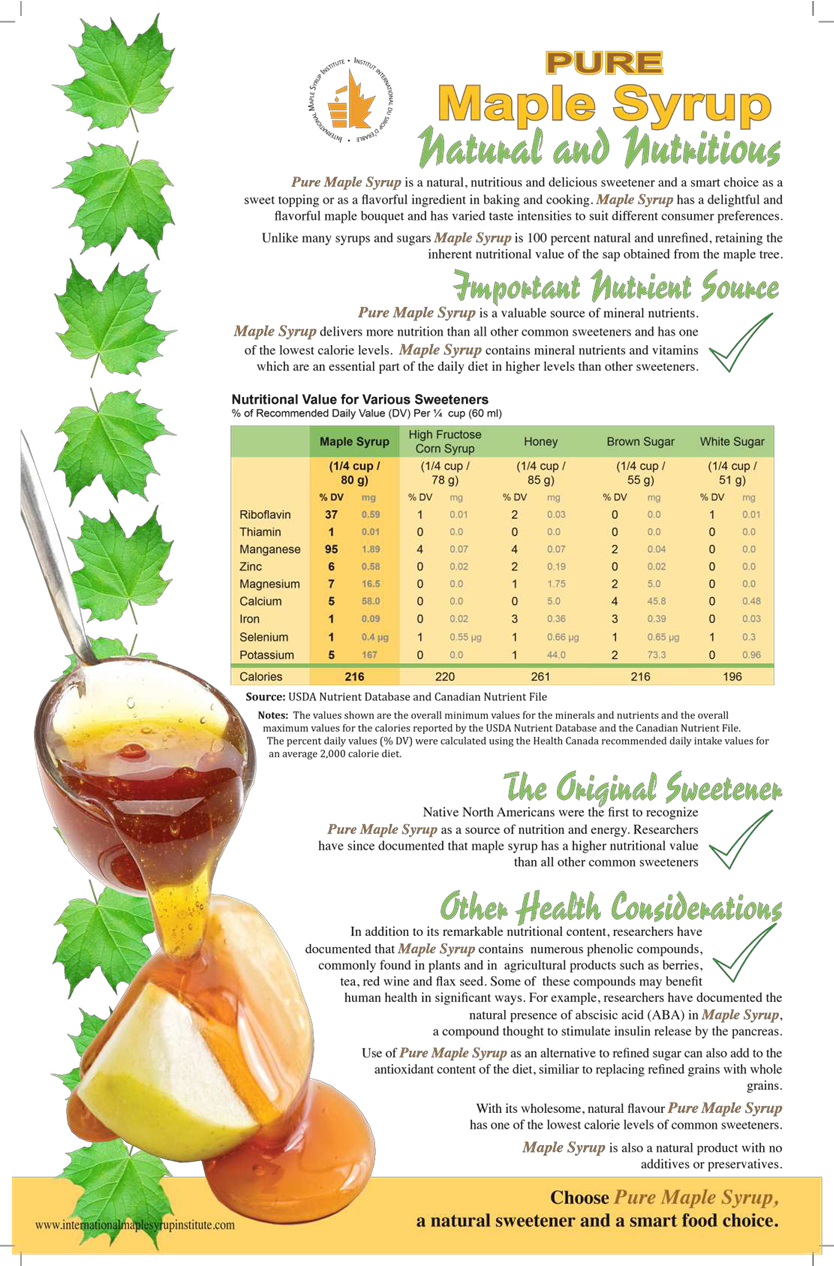
Maple Syrup Nutrition Profile
Maple syrup -- a local food made in small batches at thousands of maple farms.
Maple syrup is a sustainable North American agricultural crop made right on location, at the farm, in the woods at thousands of small rural maple tree farms in central and eastern United States and Canada.
Pure maple syrup is made by concentrating the slightly sweet sap of the Acer saccharum or sugar maple tree through a process of heating and evaporation. The sap is collected by tapping the trees with small, tree-friendly spouts that do not harm the tree. The sap is then gathered and boiled in an evaporator, filtered and bottled.
Maple Syrup is a single ingredient food.
A simple food made from one source - Pure maple syrup is a simple food made from maple sap only. It requires only minimal processing and contains absolutely no additives. Maple syrup substitutes and imitations do not provide the same beneficial nutrients found in pure maple syrup.
Maple syrup is the smarter sweetener.
Pure maple syrup is known as the smarter sweetener because it contains minerals (manganese), vitamins (riboflavin), amino acids and more than 67 bioactive natural plant compounds with potential health benefits. For that reason, maple syrup is a smart alternative to processed sugar, corn syrup and fructose and high fructose syrups and artificial chemical sweeteners.
Laboratory research found that several of these compounds possess antioxidant and anti-inflammatory properties that may have beneficial effects on health. Maple has some of the same beneficial compounds that are found in berries, some that are found in tea and some that are found in flaxseed. Few, if any, other natural sweeteners have this anti-oxidant cocktail of compounds and only pure maple syrup contains this unique cocktail of substances with potential health benefits.
The Science.
Over the past decade, a group of scientists led by Professor Navindra Seeram at the College of Pharmacy at University of Rhode Island have conducted extensive research on pure maple syrup and the phytonutrients it contains. See The research focused on identifying bioactive plant compounds (known as phytochemicals or phytonutrients) and evaluating the biological effects of maple syrup, maple water (i.e. maple sap), and maple plant parts and their derived extracts. To date, there are several published studies (see https://web.uri.edu/maple/ )that support the positive biological effects of maple syrup.
Maple syrup contains over 100 different substances including mono-and disaccharides (primarily as sucrose), complex sugars (i.e. oligosaccharides), minerals, amino acids, organic acids, phytohormones, vitamins, and phytochemicals. Professor Seeram’s current research focus is phytochemicals and they have isolated and identified several phytochemicals in maple syrup. Interestingly, maple syrup contains a diverse cocktail of different chemical sub-classes of plant compounds (known as polyphenols or phenolics) which are also found in several other plant foods including flax, tea, berries, and red wine. These molecules are all found in one ‘sweet’ package in maple syrup; remarkably, many compounds which naturally occur in maple sap survive the concentration process to persist in maple syrup and co-exist along with others which are formed during processing.
In summary, the “triple whammy” of unique chemical composition of macronutrients, micronutrients, and phytochemicals in maple syrup (see Figure 1), in combination with their promising biological activities, supports its functional food applications.
